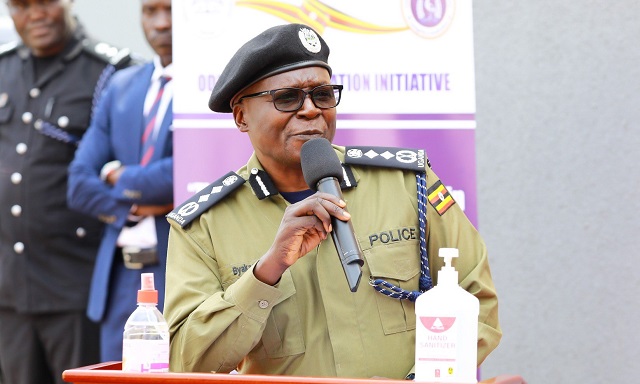
Kampala, Uganda | THE INDEPENDENT | In May, the Inspector General of Police, Abas Byakagaba, will be spending one year at the helm of the Uganda Police Force. Byakagaba replaced Martin Ochola who held the mantle for six years.
On Wednesday at the 28th Police Council Meeting held at police headquarters, Naguru, Byakagaba informed President Museveni that the force has a lot of things they intend to achieve such as peaceful policing of the forthcoming general elections, and addressing the rampant problem of indecent police officers’ housing units.
“Our strategic priorities include ensuring security during the forthcoming elections, improving crime detection and response, enhancing officers’ professionalism and welfare including housing, career development, and health and strengthening community policing,” Byakagaba said.
Byakagaba’s statement is a reflection of what his predecessor Ochola hoped to achieve when he took over the police leadership from Gen Edward Kale Kayihura in 2018. Ochola listed several things he intended to achieve such as building housing units for police officers across the 27 policing regions, reducing crime and enforcement of measures intended to promote and respect human rights by all law enforcers.
However, Ochola’s optimism was hampered by the immediate ‘cutting’ down of the police budget year in and year out. In his first year, the police budget of 2018/2019 was slashed by more than 200 billion shillings. In that year, police had presented a budget framework which was more than a trillion shillings but they were allocated only 540 billion shillings which was 200 billion less to the force’s funding of the 2017/2018 financial year.
In response to this insufficient budget funding, Ochola cried out to Museveni in November during a police council meeting, that the force he was superintending could not achieve much with limited resources. Ochola raised the issue of housing units before Museveni indicating that the police personnel were living conditions that needed urgent attention. He went ahead and indicated these matters in the 2019 annual crime report.
“The UPF continues to face several challenges in tackling crime, these are; Manpower and logistical constraints and insufficient budget, Capacity gaps in terms of training,” Ochola said in the 2019 annual crime report. These issues were subsequently raised in the preceding annual crime reports and meetings with ministers for internal affairs.
However, Ochola’s call for increased funding to the police force was never implemented during his six-year tenure. Other than completing 360 housing units which were left under construction by Gen Kayihura and recruiting nearly 10,000 police constables and Assistant Inspectors of Police (AIPs), Ochola left nothing much attributed to his tenure because of insufficient funding.
Before his sacking, Gen Kayihura had embarked on the construction of 10,000 housing units in 2016 starting with 360 at police headquarters and 1,020 others were supposed to be built in regions within Kampala metropolitan in the first and second phases. All these were supposed to be completed in a five-year timeframe but it is now heading to 10 years.
Police officers who were part of Gen Kayihura’s projection of improving welfare and housing units said unless the police budget is increased, IGP Byakagaba will not achieve much because this frustration was the reason why Ochola declined the three-year renewal of his contract.
“I saw several people who were sent including two ministers to convince Ochola to accept a new three-year contract but he was tired of running an institution in a financial crisis. We had several scenarios where a broken-down vehicle could not be repaired. DPCs started getting fuel of only 400,000 shillings to run a whole division for the entire month. It was a crisis that we kept denying,” a senior police said.
Almost every year during Ochola’s tenure, police faced fuel, water and electricity crises because of unpaid debts. Fuel suppliers stopped giving fuel to police cars while the National Water and Sewage Cooperation disconnected supplies because of unpaid bills.
“We pray that the President listens to IGP Byakagaba regarding increasing funding to the police force. If it is not done, he will face the same problems. He has already witnessed many of them including a fuel crisis which hit us in the second quarter of this financial year,” another senior police officer said.
In December last year, several media houses reported how police vehicles had been grounded over fuel crisis. This was after the force’s fuel budget was cut from 70 billion shillings to 46 billion shillings in this fiscal year. By the time fuel dealers decided to stop supplying fuel to the police in December last year, they were demanding over 90 billion shillings.
“I was happy that the media reported the fuel crisis two months ago because it forced the parliament to debate it and in the end, the Ministry of Finance intervened. But this was a shot-time solution and we are likely to experience the same very soon,” another senior officer said.
IGP Byakagaba’s explanation of the force’s strategic plan to President Yoweri Museveni has left many wondering whether the force will eventually earn the Commander in Chief’s ear or he will face similar challenges to his predecessor Ochola.
****
URN
 The Independent Uganda: You get the Truth we Pay the Price
The Independent Uganda: You get the Truth we Pay the Price



 Anthony Natif notes from Court: Prosecution case enters final stretch
Anthony Natif notes from Court: Prosecution case enters final stretch
